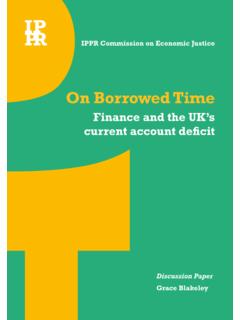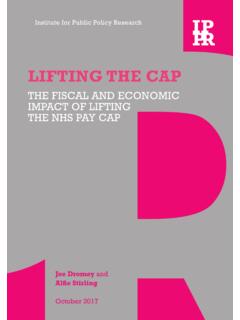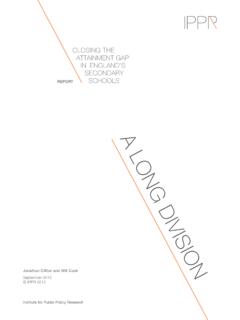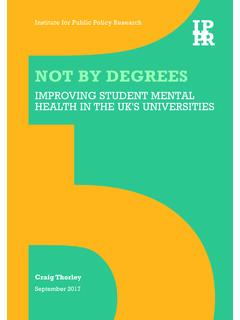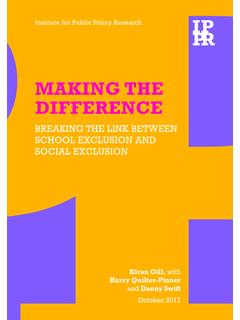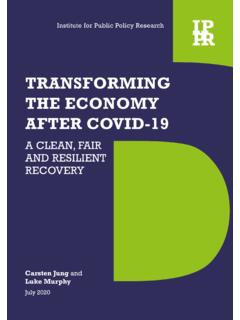Transcription of The Constitution of the United Kingdom - Home | IPPR
1 I7R. INSTITUTE FOR PUBLIC POLICY RESEARCH. 30/32 Southampton Street, London WC2E 7RA. Tel: 071-379 9400 Fax:071-497 0373. The Institute for Public Policy Research is an independent charity whose purpose is to contribute to public understanding of social, economic and political questions through research, discussion and publication. It was established in 1988 by leading figures in the academic, business and trade union community to provide an alternative to the free market think-tanks. IPPR's agenda reflects the challenges facing Britain: changes in the European continent and the European Community; the threats posed by uncontrolled industrial growth to the world's ecological balance; the impact of new technologies and scientific developments; changing social and economic relationships between women and men; the need to decentralise power to the regions and nations of Britain.
2 Besides its programme of publication, IPPR also provides a forum for political and trade union leaders, academic experts and those from business, finance, government and the media, bringing people together from throughout Britain and the European Community to discuss issues of common concern. Trustees Baroness Blackstone (Chairman) Philip Hughes Professor Patrick Bateson FRS Jeremy Isaacs Tony Christopher (Treasurer) Kate Mortimer Lord Donoughue Herman Ouseley Dr John Eatwell (Secretary) Professor Bhikhu Parekh John Edmonds Emma Rothschild Sir Denis Forman Tom Sawyer Lord Hollick 2492/Design and Print by Tony Flower/Redesign ISBN 1 87452 42 6. IPPR 1991. The Constitution of the United Kingdom CONTENTS.
3 Page Preface 1-2. INTRODUCTION 3-30. THE Constitution pp 1-136. COMMENTARY pp 1-121. 1. PREFACE. This Constitution has been drafted in the conviction that an example would advance the public argument more effectively than further general discussion of the problems which it raises and attempts to resolve. The project could not have been undertaken without the generous support of the Joseph Rowntree Charitable Trust, whose grant enabled us to hold countless meetings o f the various drafting groups, to commission specific pieces of work and to employ a coordinator to keep the show on the road. We are grateful to the Trustees for their support and to the Assistant Secretary Heather Swailes for the helpful way in which she has administered the grant.
4 Nor would the project have been possible without the willingness of many people to give freely of their time and knowledge, either as members of a working party, as contributors on particular subjects, or as advisors, consultants and critics: Advisory Group Professors Anthony Bradley, Terence Daintith, Jeffrey Jowell, Patrick McAuslan and Keith Patchett, and Anthony Lester QC. Working Parties Dr Robert Blackburn, Professor Gavin Drewry, Professor Ronald Dworkin, Ann Dummett, Patricia Hewitt, Sir William Goodhart QC, Nicola Lacey, John McEldowney, D r Jeremy Mitchell, Nuala Mole, Dawn Oliver and Sarah Spencer. Contributors to draft Brice Dickson, Laurens Fransman, Josh Hillman, Beverley Lang, Dr Gerry Rubin and Professor Ian Willock Advice and Consultation Geoffrey Bindman, Professor Kevin Boyle, Madeleine Colvin, Alis.
5 Tair Darling MP, Professor Keith Ewing, Tess Gill, Peter Gill, Professor Malcolm Grant, Professor John Kay, Professor Norman Lewis, Lau . rence Lustgarten, Professor David Marquand, Bob McCreadie, Ron Medlow, Richard Norton Taylor, Professor Claire Palley, William Plowden, Clive Ponting, Jim Ross, Anthony Scrivener QC, Stephen Smith, Ian Snaith, Dr Hugo Storey, Tony Travers and Professor Sir David Williams. 2. A draft by many hands is apt to look like patchwork. That this final version has some consistency of style and substance is due to the heroic efforts o f Keith Patchett who at a late stage took the draft in hand and imposed order upon it. We are greatly indebted to him. Likewise to Sarah Spencer whose skill, patience, good humour and persistence has bought the project to completion.
6 Nobody involved agrees with everything in this Constitution and that includes myself. The responsibility for the final result is however my own and I am doubly grateful to all who have contributed for their forbearance throughout this exercise in guided democracy. James Cornford July 1991. 3. INTRODUCTION. I. This draft Constitution for the United Kingdom consists of 129. Articles and 6 schedules, accompanied by a commentary which explains the derivation and purpose of each provision. The main features of the Constitution are as follows: (1) The Constitution is the sole source o f authority for all public action, executive, legislative or judicial. Henceforth authority must be sought not in common law principles such as parliamen.
7 Tary sovereignty or prerogative power, nor in constitutional con . ventions, such as ministerial responsibility, but in the written provisions of this Constitution . (Article 1). (2) The Constitution is placed in the context of the United King . dom's international and European commitments. (Article 1). Specific commitment to European Community Law is provided under Article 50 and to international obligations under Article 51. (3) The Constitution incorporates a Bill of Rights based on the Eu . ropean Convention on Human Rights and on the United Nations international Covenant on Civil and Political Rights, to both of which the United Kingdom is signatory, and provides the means for its enforcement (Articles 2 to 26).
8 It also includes a declaratory statement o f Social and Economic Rights (Article 27) and public rights of access to official information and controls on the use of personal information by public authorities. (Articles 28 and 29). (4) British nationality is defined, together with the rules governing the acquisition and loss o f British nationality, allegiance and dual nationality, and the civic rights o f non-nationals (Articles 30 to 33). (5) The position of the Queen as Head o f State is confirmed but the residual prerogative powers o f the Monarchy (eg over the ap . pointment o f the Prime Minister) are removed and the Monarchy becomes a wholly dignified part of the Constitution (Articles 34. to 39).
9 4 INTRODUCTION. (6) The prerogative powers exercised by the Executive are defined in the Constitution and subjected to Parliamentary control: eg the making of treaties (Article 51), the declaration of war (Article 122), deployment of the Armed Forces (Article 123), national security (Article 126) and declarations o f emergency (Article 128).Substantial areas of patronage are removed from the Ex . ecutive by transferring powers of appointment from Ministers to the Public Services Commission (Article 115) and a Judicial Ap . pointments Commission for the United Kingdom and Judicial Services Commissions for England and Wales, Scotland and Northern Ireland (Articles 102 and 103). (7) The Prime Minister is elected by the House o f Commons and is subject to a personal vote of no confidence which does not involve the dissolution of the House.
10 The Prime M inister ap . points a deputy, Ministers and the Cabinet. Ministers are required to give a statement of their responsibilities to Parliament on taking office and are bound by a Code of Conduct (Articles 40 to 46). (8) The House of Commons is elected for a fixed term o f four years, with the possibility of dissolution but with no extension o f the term of Parliament (Article 60). (9) The House of Lords is replaced by an elected Second Chamber (Article 57), also elected for a four year term, but at a two year interval from the election for the House o f Commons, and not subject to dissolution (Article 60 and Schedule 3). (10) Both Houses have a smaller membership than at present and both are to be elected by forms o f Proportional Representation: the House of Commons by a variant of the Additional Member System and the Second Chamber by the Single Transferable Vote (Articles 83 to 86 and Schedule 3).
